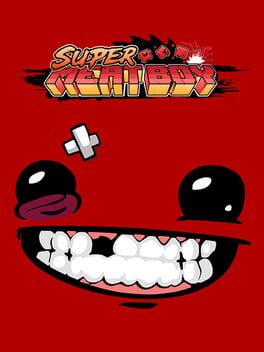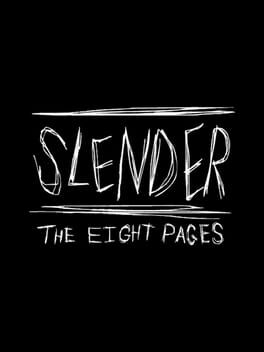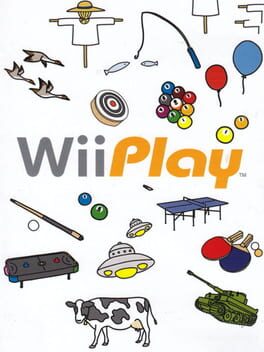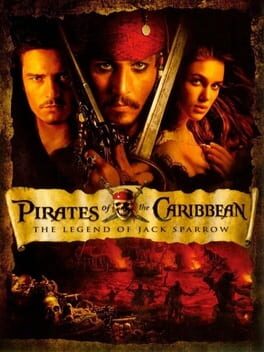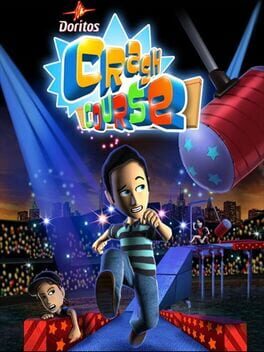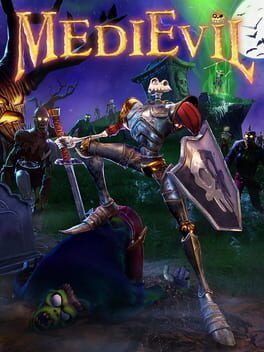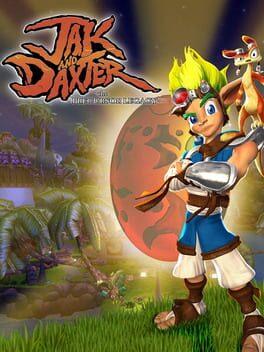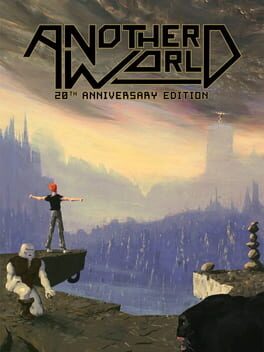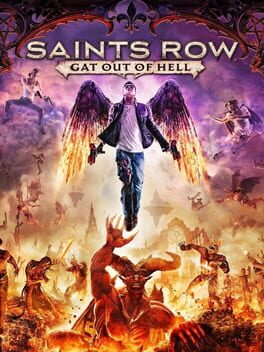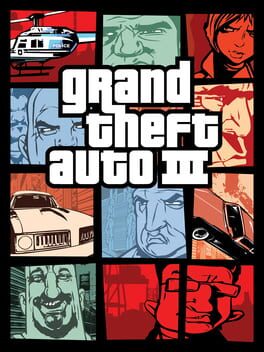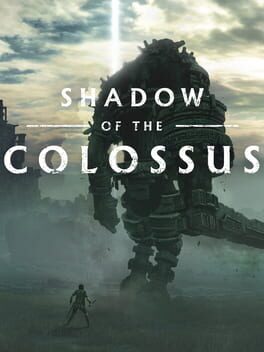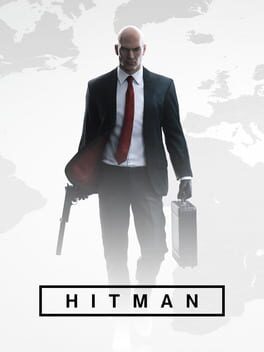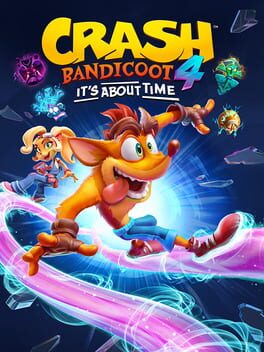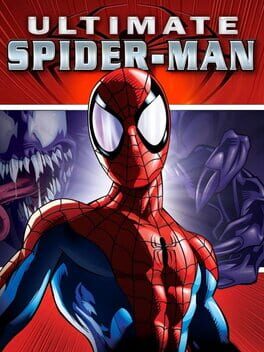Causer21
2010
For everything that this game lacks in terms of gameplay, and the fact that it doesn't hold up amazingly well today, this game was like a cultural phenomenon in 2012.
It was my own introduction into the world of survival horror, the basis for the easiest Halloween costume anybody ever had that year, and I really do have fond memories of playing this at the time (I'm pretty sure I still have it installed on my computer).
It's one of those games you give the credit it's due, and then inwardly note to never play again.
It was my own introduction into the world of survival horror, the basis for the easiest Halloween costume anybody ever had that year, and I really do have fond memories of playing this at the time (I'm pretty sure I still have it installed on my computer).
It's one of those games you give the credit it's due, and then inwardly note to never play again.
2006
Where some games boast complexity and impactful narratives as their primary selling point, The Legend of Jack Sparrow sails by on familiar hack'n'slash combos, refreshingly simplistic gameplay, and the immortal charisma of Johnny Depp.
Based on the reviews, I really didn't think I was going to enjoy this game, but it really is just a fun PS2 era game during which you can switch off and just wail on some pirates and other, more fantastical beings. At the end of the day, it's got a relatively satisfying narrative in which it retells the events of The Curse of the Black Pearl - with some tweaks and embellishments for good measure. These embellishments are clearly factored in for extended gameplay, but I really enjoyed the way they worked it into the narrative. It reaches certain points wherein Jack is telling a story within a story, and Will gets increasingly meta and frustrated wondering why he seems to be in all of Jack's stories. It's purely to allow for co-operative multiplayer but hot damn if it isn't entertaining.
Don't get me wrong, I never said this game is a work of art; it is prone to light frame rate drops, and the voice acting isn't exactly top tier, even with the inclusion of Johnny Depp. The gameplay can be somewhat repetitive and simplistic, but for a light rip off of God of War, you get what you pay for, and I only paid £00.50 - besides, it sure is fun for when you want to game for short periods at a time.
I actually owned this game as a kid, but I got stuck halfway through and sold it off. I bought it once again for the sake of finally beating it, and found something of a buried treasure that I think should be enjoyed just for what it is - a witty, accessible action game that you don't have to take seriously at all.
(Also on the PS2, every time the game gives you a new objective, it makes a sound that resembles Borat saying "wawaweewa" and that's all I heard throughout the whole game, you're welcome)
Based on the reviews, I really didn't think I was going to enjoy this game, but it really is just a fun PS2 era game during which you can switch off and just wail on some pirates and other, more fantastical beings. At the end of the day, it's got a relatively satisfying narrative in which it retells the events of The Curse of the Black Pearl - with some tweaks and embellishments for good measure. These embellishments are clearly factored in for extended gameplay, but I really enjoyed the way they worked it into the narrative. It reaches certain points wherein Jack is telling a story within a story, and Will gets increasingly meta and frustrated wondering why he seems to be in all of Jack's stories. It's purely to allow for co-operative multiplayer but hot damn if it isn't entertaining.
Don't get me wrong, I never said this game is a work of art; it is prone to light frame rate drops, and the voice acting isn't exactly top tier, even with the inclusion of Johnny Depp. The gameplay can be somewhat repetitive and simplistic, but for a light rip off of God of War, you get what you pay for, and I only paid £00.50 - besides, it sure is fun for when you want to game for short periods at a time.
I actually owned this game as a kid, but I got stuck halfway through and sold it off. I bought it once again for the sake of finally beating it, and found something of a buried treasure that I think should be enjoyed just for what it is - a witty, accessible action game that you don't have to take seriously at all.
(Also on the PS2, every time the game gives you a new objective, it makes a sound that resembles Borat saying "wawaweewa" and that's all I heard throughout the whole game, you're welcome)
2010
2019
This review contains spoilers
As a preface I just want to outline that this is only a review of the remake itself.
That being said - God damn, this is one of the greatest remakes of all time. It is practically beat for beat perfect to the original PS1 classic, down to even using the same voice clips from the 1998 Medievil. This might just be the definitive way to play Medievil, hell you could just go throw away your PS1 copy, but we'll get to that later.
It's clear that this remake was crafted with such a love and reverence to the original that it practically bleeds into every level. The puzzles, while sometimes simplistic, still hold up really well and often require a good thinking about, the familiar hack'n'slash combat is as great as ever, and the new multi-weapon system is an absolute lifesaver. Where the original required the player to scroll dolefully through the weapon menu to change weapons, the remake not only allows for quick access through the weapon menu, but it also has added a two-slot weapon system, allowing the player to quickly switch between two weapons. This is great for encouraging the player to use more of the wide variety of weapons that can be unlocked through gameplay. The orchestral soundtrack is as beautiful as it is chilling, and the gameplay is smooth as butter. Sir Dan controls even better than in the original, with perfect running speed, and pinpoint accurate platforming - both great improvements to the original, where Dan would control somewhat clumsily.
On the other hand, barring this remake from being a perfect 10 are a couple of small issues, for example the actual way that the game plays - there are framerate drops that can affect gameplay, but not to a great degree. The slightly larger problem exists within the graphics and atmosphere of the remake. Don't get me wrong, Medievil 2019 looks absolutely incredible, and the graphics and art style are flawless. However, Medievil loses a special something in its translation to the modern day - it just doesn't have the same creepy atmosphere running throughout the game. Medievil 1998 is the first game I ever remember scaring me - the weird uncanny way that the undead moved, the darkness of the sky and the general colour palette. There was something about the pixel-y graphics that gave the 1998 original a certain charm, but to a larger degree, a terrifying gothic undercurrent that ran throughout the game, that is just missing from Medievil 2019. While this doesn't take away from the quality of the remake, it does just subtract from the atmosphere, and makes that tension noticeably absent.
In spite of this, the developers should be proud of Medievil 2019 - and I think they are, because they literally put the original game as an additional unlockable bonus within the remake, as if to demonstrate how well the remake stands up to Medievil 1998. Finding and putting to rest all 19 of the lost souls throughout the game allows the player to play the original Medievil in its entirety from the main menu. Not only does this provide extra replay value within the main game, but it gives the opportunity to directly compare the remake to the original and see how perfectly it was crafted.
OtherOcean have truly set a standard here in terms of classic videogame remakes. While it is not a perfect remake, it certainly has given Sir Daniel Fortesque a chance to rise again, and show players why Medievil is such a cult classic, and how its quality remains alive and well to this day.
That being said - God damn, this is one of the greatest remakes of all time. It is practically beat for beat perfect to the original PS1 classic, down to even using the same voice clips from the 1998 Medievil. This might just be the definitive way to play Medievil, hell you could just go throw away your PS1 copy, but we'll get to that later.
It's clear that this remake was crafted with such a love and reverence to the original that it practically bleeds into every level. The puzzles, while sometimes simplistic, still hold up really well and often require a good thinking about, the familiar hack'n'slash combat is as great as ever, and the new multi-weapon system is an absolute lifesaver. Where the original required the player to scroll dolefully through the weapon menu to change weapons, the remake not only allows for quick access through the weapon menu, but it also has added a two-slot weapon system, allowing the player to quickly switch between two weapons. This is great for encouraging the player to use more of the wide variety of weapons that can be unlocked through gameplay. The orchestral soundtrack is as beautiful as it is chilling, and the gameplay is smooth as butter. Sir Dan controls even better than in the original, with perfect running speed, and pinpoint accurate platforming - both great improvements to the original, where Dan would control somewhat clumsily.
On the other hand, barring this remake from being a perfect 10 are a couple of small issues, for example the actual way that the game plays - there are framerate drops that can affect gameplay, but not to a great degree. The slightly larger problem exists within the graphics and atmosphere of the remake. Don't get me wrong, Medievil 2019 looks absolutely incredible, and the graphics and art style are flawless. However, Medievil loses a special something in its translation to the modern day - it just doesn't have the same creepy atmosphere running throughout the game. Medievil 1998 is the first game I ever remember scaring me - the weird uncanny way that the undead moved, the darkness of the sky and the general colour palette. There was something about the pixel-y graphics that gave the 1998 original a certain charm, but to a larger degree, a terrifying gothic undercurrent that ran throughout the game, that is just missing from Medievil 2019. While this doesn't take away from the quality of the remake, it does just subtract from the atmosphere, and makes that tension noticeably absent.
In spite of this, the developers should be proud of Medievil 2019 - and I think they are, because they literally put the original game as an additional unlockable bonus within the remake, as if to demonstrate how well the remake stands up to Medievil 1998. Finding and putting to rest all 19 of the lost souls throughout the game allows the player to play the original Medievil in its entirety from the main menu. Not only does this provide extra replay value within the main game, but it gives the opportunity to directly compare the remake to the original and see how perfectly it was crafted.
OtherOcean have truly set a standard here in terms of classic videogame remakes. While it is not a perfect remake, it certainly has given Sir Daniel Fortesque a chance to rise again, and show players why Medievil is such a cult classic, and how its quality remains alive and well to this day.
This certainly isn't one of Naughty Dog's best endeavours, it seems the transition to PS2 hardware wasn't smooth for even these veteran developers, with this first instalment not quite reaching the highs of their PS1 counterparts. In spite of how famous Crash Bandicoot is for its platforming mechanics, Jak's platforming just feels off by a mite. There are frequent occurrences of Jak's movement feeling slippy, with the player camera also suffering this issue. Most often are the occasions when Jak's double jump simply doesn't work, or the player camera literally just shifts off to the side for no reason, and it can't be recentered behind Jak without it doing the same thing again. Frustratingly this leads to many deaths that are simply of no fault by the player. More than anything else, these faults make Jak & Daxter an absolute chore to play.
The following is a small personal gripe I have, but I'm just not a big fan of platformers or collectathons that have that really open world feel. When playing a platformer or collectathon, I prefer separated levels with a clear beginning and end point, instead of one long area. It's an issue I held with Spyro: A Hero's Tail, and it's an issue I hold here too. Open world games are great, but I just don't think I like them in this genre. Call me a traditionalist but if it worked for years for Spyro, Crash and Mario, there's no reason it can't still work here. I admire ND for trying something a little different with the open world but it's not for me.
Further to this, for a large portion of the game, Jak's only motivation to continue with his adventure is to transform Daxter back into a person - but this motivation comes crashing down for the player very quickly because the very 'person' that we're trying to help is one of the most annoying player companions to ever disgrace a video game. I mean jheeze does Daxter ever shut up?!
Sure, there are some elements of this game that I liked. Some of the minigames are pretty fun, the level design is pretty enough, but also pretty bland and certainly directionless. Unfortunately, any bright spot that this game shines is just dwarfed, not only by its many faults, but by its many superior contemporaries like Ratchet & Clank.
I have to say I'm not sad to see the back of this game, I couldn't even find it in myself to collect the remaining power cells, I only completed the story out of obligation. I don't believe I'll ever revisit this game, and based on what I've heard about its sequels, I'll be giving those a miss too. Trust me, if you skip this game, you won't be missing much either.
The following is a small personal gripe I have, but I'm just not a big fan of platformers or collectathons that have that really open world feel. When playing a platformer or collectathon, I prefer separated levels with a clear beginning and end point, instead of one long area. It's an issue I held with Spyro: A Hero's Tail, and it's an issue I hold here too. Open world games are great, but I just don't think I like them in this genre. Call me a traditionalist but if it worked for years for Spyro, Crash and Mario, there's no reason it can't still work here. I admire ND for trying something a little different with the open world but it's not for me.
Further to this, for a large portion of the game, Jak's only motivation to continue with his adventure is to transform Daxter back into a person - but this motivation comes crashing down for the player very quickly because the very 'person' that we're trying to help is one of the most annoying player companions to ever disgrace a video game. I mean jheeze does Daxter ever shut up?!
Sure, there are some elements of this game that I liked. Some of the minigames are pretty fun, the level design is pretty enough, but also pretty bland and certainly directionless. Unfortunately, any bright spot that this game shines is just dwarfed, not only by its many faults, but by its many superior contemporaries like Ratchet & Clank.
I have to say I'm not sad to see the back of this game, I couldn't even find it in myself to collect the remaining power cells, I only completed the story out of obligation. I don't believe I'll ever revisit this game, and based on what I've heard about its sequels, I'll be giving those a miss too. Trust me, if you skip this game, you won't be missing much either.
Another World is quite simply magnificent.
This is the only version I have played, as I never played the original so this review will be purely based on my experience on the Switch.
That said, I personally think that this game is a practically perfect >1 hour adventure. Immersive, and with a wonderful colour palette, Another World truly transports you away and into the adventure feet first.
The control scheme works exactly as it should, with each step and jump landing exactly how it feels it should - so long as you take your time and step carefully! Much in the style of the more recent Super Meat Boy, Another World is a platformer that relies its progress largely on trial and error. This may sound exhausting, but similarly to the aforementioned SMB, Another World also provides regular checkpoints, combined with instant character reloads to make for a truly smooth trial and error format.
The puzzle component is also fantastic, requiring the player to take notice of all of the elements of gameplay and the information provided on screen to solve whatever puzzle of nuance the game throws at you next.
It's incredibly captivating, it never overstays its welcome, and plays exactly as it should, it would be hard for me to give Another World anything less than a perfect score.
This is the only version I have played, as I never played the original so this review will be purely based on my experience on the Switch.
That said, I personally think that this game is a practically perfect >1 hour adventure. Immersive, and with a wonderful colour palette, Another World truly transports you away and into the adventure feet first.
The control scheme works exactly as it should, with each step and jump landing exactly how it feels it should - so long as you take your time and step carefully! Much in the style of the more recent Super Meat Boy, Another World is a platformer that relies its progress largely on trial and error. This may sound exhausting, but similarly to the aforementioned SMB, Another World also provides regular checkpoints, combined with instant character reloads to make for a truly smooth trial and error format.
The puzzle component is also fantastic, requiring the player to take notice of all of the elements of gameplay and the information provided on screen to solve whatever puzzle of nuance the game throws at you next.
It's incredibly captivating, it never overstays its welcome, and plays exactly as it should, it would be hard for me to give Another World anything less than a perfect score.
I went into this experience fully expecting to hate it, based on the dumpster fire that was Saints Row IV. While I didn't love Gat Out of Hell, I can't exactly say that I hated it either.
Unfortunately that just leaves us in the middle ground of an ultimately forgettable game that I can tell will leave no lasting impact on me. This game is simultaneously laden with fan service, and yet also doesn't seem to understand why the Saints Row franchise has fans in the first place.
The flying mechanics are probably the stand out of the entire game, they are genuinely some of the best flight mechanics I've experienced in a video game, and it is really telling that Deep Silver clearly want to be making a different type of game entirely. So why do they continue to desecrate the good name of Saints Row when they're so obviously disinterested in the series?
Saints Row IV was a glorified DLC of The Third, which essentially makes Gat Out of Hell a glorified DLC of a glorified DLC. Gat Out of Hell also suffers an exacerbated issue that has plagued Saints Row for the last 3 instalments wherein many of the 'missions' are actually just optional open world activities. This issue has been growing with each instalment since Saints Row The Third and it has never been more apparent than with GOoH; you could likely count on one hand the amount of missions there are that are anything more than just an activity. Gat Out of Hell consequently can be summarised as an open world activity collection/flight simulator.
Yet another of the many issues that plague GOoH is the sheer repetitiveness of the gameplay, with challenges and achievements both geared towards performing the same actions tens and hundreds of times. This artificial stretching of the gameplay time leads to such severe tedium that I would be impressed by anybody with the patience to master this game 100%, achievements and all.
This has the potential to be a pretty okay game, which already isn't saying much - and additionally this is definitely not a true Saints Row game, which makes the disappointment so much worse. However, thanks to Games with Gold on Xbox, I got this game for free so I won't complain that much....y'know...apart from 90% of this review.
Unfortunately that just leaves us in the middle ground of an ultimately forgettable game that I can tell will leave no lasting impact on me. This game is simultaneously laden with fan service, and yet also doesn't seem to understand why the Saints Row franchise has fans in the first place.
The flying mechanics are probably the stand out of the entire game, they are genuinely some of the best flight mechanics I've experienced in a video game, and it is really telling that Deep Silver clearly want to be making a different type of game entirely. So why do they continue to desecrate the good name of Saints Row when they're so obviously disinterested in the series?
Saints Row IV was a glorified DLC of The Third, which essentially makes Gat Out of Hell a glorified DLC of a glorified DLC. Gat Out of Hell also suffers an exacerbated issue that has plagued Saints Row for the last 3 instalments wherein many of the 'missions' are actually just optional open world activities. This issue has been growing with each instalment since Saints Row The Third and it has never been more apparent than with GOoH; you could likely count on one hand the amount of missions there are that are anything more than just an activity. Gat Out of Hell consequently can be summarised as an open world activity collection/flight simulator.
Yet another of the many issues that plague GOoH is the sheer repetitiveness of the gameplay, with challenges and achievements both geared towards performing the same actions tens and hundreds of times. This artificial stretching of the gameplay time leads to such severe tedium that I would be impressed by anybody with the patience to master this game 100%, achievements and all.
This has the potential to be a pretty okay game, which already isn't saying much - and additionally this is definitely not a true Saints Row game, which makes the disappointment so much worse. However, thanks to Games with Gold on Xbox, I got this game for free so I won't complain that much....y'know...apart from 90% of this review.
2001
As is often the case with very early games in a popular series, I respect GTA III for everything it did for the franchise. It's very clear how and why this game was revolutionary for Rockstar, Grand Theft Auto, and gaming in general. It's also astounding just how much freedom this game gives you to pass missions in any way you want, something that is sorely missing from the heavily scripted nature of Rockstar's later releases. The soundtrack, while understandably barebones in comparison to later GTA games, is still pretty good; I can forgive it entirely just because it includes Paul Engemann's 'Scarface', a fantastic song that fit so perfectly with the tone of this game. Also the voice cast for this game is surprisingly rock solid, the familiar voices of Michael Madsen, Michael Rapaport and Kyle Machlachlan in particular lend so much personality to this instalment.
Unfortunately that's about where it ends for this game, as this experience truly highlights just how spoiled players are these days, considering what GTA III had to work with. The camera is almost impossible to move whilst the player is moving which leads to many frustrating moments of very restricted movement and turning. Aiming and shooting is nigh impossible unless you're practically nose to nose with the subject you're trying to kill. The Wanted system is also bizarre, leaving very little freedom to escape the cops in organic ways, and an over reliance on pay'n'sprays - which by the way, don't even have a marker on the mini map during many missions. So unless you know the map of Liberty City by heart (and why wouldn't you, when playing GTA III for the very first bleeding time) they become impossible to find.
Oh yeah that's another thing, there is literally no pause menu map like in every other Rockstar game; sure there's a pullout map in the physical game box, but have you seen that thing? Not only is it not top down, (like literally every map in existence should be), for some unknown reason, but also it is covered in graphics that just make it all the more confusing for a first time player. I'm not going to study this mess of a physical map just to find a pay'n'spray that should be marked on the in-game mini map.
There is a lot to love and respect about Grand Theft Auto III - unfortunately, when you take all of it's far, far superior younger siblings into account, there are far too many frustrations that come with it. This makes it by default, easily the worst 3D era Grand Theft Auto.
Also fun fact: the cars on this game are made of papier-mâché.
Unfortunately that's about where it ends for this game, as this experience truly highlights just how spoiled players are these days, considering what GTA III had to work with. The camera is almost impossible to move whilst the player is moving which leads to many frustrating moments of very restricted movement and turning. Aiming and shooting is nigh impossible unless you're practically nose to nose with the subject you're trying to kill. The Wanted system is also bizarre, leaving very little freedom to escape the cops in organic ways, and an over reliance on pay'n'sprays - which by the way, don't even have a marker on the mini map during many missions. So unless you know the map of Liberty City by heart (and why wouldn't you, when playing GTA III for the very first bleeding time) they become impossible to find.
Oh yeah that's another thing, there is literally no pause menu map like in every other Rockstar game; sure there's a pullout map in the physical game box, but have you seen that thing? Not only is it not top down, (like literally every map in existence should be), for some unknown reason, but also it is covered in graphics that just make it all the more confusing for a first time player. I'm not going to study this mess of a physical map just to find a pay'n'spray that should be marked on the in-game mini map.
There is a lot to love and respect about Grand Theft Auto III - unfortunately, when you take all of it's far, far superior younger siblings into account, there are far too many frustrations that come with it. This makes it by default, easily the worst 3D era Grand Theft Auto.
Also fun fact: the cars on this game are made of papier-mâché.
Yeah this one was aight, I don't know if I would go so far as to call it one of the greatest games of all time though.
The gameplay element is rightfully the best part of the experience; the ingenuity and variation across the 16 puzzle-based boss fights is truly a gaming spectacle, and an experience not to be missed. On the other hand, I did often feel as though I was fighting against the controls. Also the story didn't suck me in quite like I was led to believe it would, and I just didn't really care about any of the characters in all honesty.
Maybe I'll revisit this one far in the future, knowing what I know now about the 'story' and its end result, but if it didn't suck me in the first time, I'm not hopeful.
The gameplay element is rightfully the best part of the experience; the ingenuity and variation across the 16 puzzle-based boss fights is truly a gaming spectacle, and an experience not to be missed. On the other hand, I did often feel as though I was fighting against the controls. Also the story didn't suck me in quite like I was led to believe it would, and I just didn't really care about any of the characters in all honesty.
Maybe I'll revisit this one far in the future, knowing what I know now about the 'story' and its end result, but if it didn't suck me in the first time, I'm not hopeful.
This review contains spoilers
To begin at a surface level, setting aside the story details, this instalment has everything you'd expect from a modern Naughty Dog release. The controls are intuitive and react well; the graphics are gorgeous, and it is overall a perfectly competent gaming experience. If you enjoyed the gameplay of the original The Last of Us, then great news, that gameplay makes a return here with some interesting twists and updates.
There's a new personality-based system introduced in this sequel that aims to provide a level of humanity for the previously faceless hordes of living enemies that you encounter. This system gives names to each of the living enemies, that when encountered or killed, the other enemies will shout their name, in order to remind the player that that was a human being and it's now time for the player to feel bad, I guess. However, this system is very surface-level, and it is for this reason that it fails for the most part. Because now I just....know the name of the guy I killed, and then I've forgotten it entirely because I've already moved on to the next enemy. Perhaps this personality system would work better if it was implemented alongside a morality or choice-based system wherein the player could choose to avoid killing, or avoid these combat scenarios entirely. In this way, the killing of the enemies would be on the player's head should they choose to engage. At present, the intended guilt doesn't carry any weight because I know that the game almost always requires me to kill to progress. I'm not doing it out of choice, and I can't continue the game without doing so, therefore there is no guilt. This system doesn't even serve a narrative purpose either, because unlike the original TLOU, Ellie's journey is entirely optional, so nobody has forced her into the position of killing; if killing in TLOU2 were as optional for the player as it is for Ellie, this system would work, but it isn't, so it doesn't.
Spoilers from here on
I became actively annoyed at about the halfway mark after Seattle Day 3, at which point the game inexplicably switches to Abby's perspective. This wasn't because I dislike Abby's character - instead it was because I had spent what adds up to hours of gameplay scouring every corner of every environment during the first half of the game to find supplements, parts and supplies to make Ellie as strong and equipped as she can possibly be, only to then be dropped back at square one to do the exact same with Abby. I simply do not understand why the game would spend so long developing Ellie's strengths, with the action and the tension all rising to a crescendo, to then stop the story dead in its tracks and rewind 3 days. At this point all tension is entirely dead, whilst the player has to grind through the now snail-like pacing of the beginning of Abby's story. Surely the two characters' stories would have been better told were they intertwined for the length of the game? For example, spend a day with Ellie, a day with Abby and so on until each character reaches their climax together (no pun intended). This way each character is developed in both story and gameplay at the same pace, and neither side becomes stagnant because it is teased out across the length of the game, rather than spending ten straight hours with Ellie, and then ten straight hours with Abby. This would also improve the characterisation of the Wolves that Ellie kills, because we get to see them through Abby's eyes first - I don't care about seeing the Wolves with Abby after I've already killed them as Ellie. Let the player get to know the Wolves with Abby, before moving on to Ellie's story where she kills them like any other videogame enemy; Ellie won't feel anything but the player definitely will.
That said, I really like it when stories tell the same narrative from multiple perspectives, I think it's a really interesting way of telling a story, and that goes the same for The Last of Us Part II. While it wasn't done exactly to my liking as explained above, I still think it was a good idea to give the player time enough with each character that they would get attached to them. Giving the player time enough to discover their personality, quirks, fears and aspirations makes this grim tale of two characters so desperately human, which is gravely needed for the narrative to work. The sheer contrast of knowing the awful things Abby and Ellie have done to each other, yet also being able to cheer for both characters when they overcome insurmountable odds surely is exactly what Naughty Dog were attempting to do here, and I think, for the most part, it works.
There are also an abundance of compelling side characters in The Last of Us Part II that truly bring the story together in a marvellous way. No matter which side they belong to, if a companion spends an extended period of time with either of the protagonists, the player really gets to know them as complex, three dimensional characters in their own right, and so it is always devastating in the cases where the character is lost. They feel like this because each of the side characters have their own personal story occurring parallel to the protagonists', rather than their presence serving only the protagonists' journey. Just like in Part I, or the Uncharted series, Naughty Dog has a brilliant way of creating captivating characters with which to populate their worlds.
As for the story, and the ending, I don't really have room to complain honestly. While I loved the original The Last of Us, and will definitely revisit it, I only played it a couple of years ago and thus have no long-term special connection to the game, but again, I do love it. In my opinion, the story and characters felt like natural progressions of what would have happened in the aftermath of TLOU. The dual protagonists are well developed in their motivations and actions and thus I have no complaints in the story department. I really liked the fact that by the time the final confrontation happens, there is no fanfare or relief; both of the protagonists have been through so much that it's such a sad fistfight between two broken, meek women, both of whom have lost so much that this feud rightfully becomes pointless.
To address the hate and controversy surrounding this game - just because some players went into the game with certain expectations, and those expectations weren't met, doesn't make this a "bad game". If you don't like the story, that's fine; if you're disappointed because you didn't get what you hoped for, that's fine too. But at the end of the day, the developers were under no obligation to cater to those expectations, they made the game, and the narrative, that they wanted to make, just like they did with the beloved original The Last of Us.
I don't know if there will ever be a Part III in this series, but I would be satisfied if Ellie's return home is the last we see of these characters. A happy ending was never possible, but a peaceful ending is good enough for me.
There's a new personality-based system introduced in this sequel that aims to provide a level of humanity for the previously faceless hordes of living enemies that you encounter. This system gives names to each of the living enemies, that when encountered or killed, the other enemies will shout their name, in order to remind the player that that was a human being and it's now time for the player to feel bad, I guess. However, this system is very surface-level, and it is for this reason that it fails for the most part. Because now I just....know the name of the guy I killed, and then I've forgotten it entirely because I've already moved on to the next enemy. Perhaps this personality system would work better if it was implemented alongside a morality or choice-based system wherein the player could choose to avoid killing, or avoid these combat scenarios entirely. In this way, the killing of the enemies would be on the player's head should they choose to engage. At present, the intended guilt doesn't carry any weight because I know that the game almost always requires me to kill to progress. I'm not doing it out of choice, and I can't continue the game without doing so, therefore there is no guilt. This system doesn't even serve a narrative purpose either, because unlike the original TLOU, Ellie's journey is entirely optional, so nobody has forced her into the position of killing; if killing in TLOU2 were as optional for the player as it is for Ellie, this system would work, but it isn't, so it doesn't.
Spoilers from here on
I became actively annoyed at about the halfway mark after Seattle Day 3, at which point the game inexplicably switches to Abby's perspective. This wasn't because I dislike Abby's character - instead it was because I had spent what adds up to hours of gameplay scouring every corner of every environment during the first half of the game to find supplements, parts and supplies to make Ellie as strong and equipped as she can possibly be, only to then be dropped back at square one to do the exact same with Abby. I simply do not understand why the game would spend so long developing Ellie's strengths, with the action and the tension all rising to a crescendo, to then stop the story dead in its tracks and rewind 3 days. At this point all tension is entirely dead, whilst the player has to grind through the now snail-like pacing of the beginning of Abby's story. Surely the two characters' stories would have been better told were they intertwined for the length of the game? For example, spend a day with Ellie, a day with Abby and so on until each character reaches their climax together (no pun intended). This way each character is developed in both story and gameplay at the same pace, and neither side becomes stagnant because it is teased out across the length of the game, rather than spending ten straight hours with Ellie, and then ten straight hours with Abby. This would also improve the characterisation of the Wolves that Ellie kills, because we get to see them through Abby's eyes first - I don't care about seeing the Wolves with Abby after I've already killed them as Ellie. Let the player get to know the Wolves with Abby, before moving on to Ellie's story where she kills them like any other videogame enemy; Ellie won't feel anything but the player definitely will.
That said, I really like it when stories tell the same narrative from multiple perspectives, I think it's a really interesting way of telling a story, and that goes the same for The Last of Us Part II. While it wasn't done exactly to my liking as explained above, I still think it was a good idea to give the player time enough with each character that they would get attached to them. Giving the player time enough to discover their personality, quirks, fears and aspirations makes this grim tale of two characters so desperately human, which is gravely needed for the narrative to work. The sheer contrast of knowing the awful things Abby and Ellie have done to each other, yet also being able to cheer for both characters when they overcome insurmountable odds surely is exactly what Naughty Dog were attempting to do here, and I think, for the most part, it works.
There are also an abundance of compelling side characters in The Last of Us Part II that truly bring the story together in a marvellous way. No matter which side they belong to, if a companion spends an extended period of time with either of the protagonists, the player really gets to know them as complex, three dimensional characters in their own right, and so it is always devastating in the cases where the character is lost. They feel like this because each of the side characters have their own personal story occurring parallel to the protagonists', rather than their presence serving only the protagonists' journey. Just like in Part I, or the Uncharted series, Naughty Dog has a brilliant way of creating captivating characters with which to populate their worlds.
As for the story, and the ending, I don't really have room to complain honestly. While I loved the original The Last of Us, and will definitely revisit it, I only played it a couple of years ago and thus have no long-term special connection to the game, but again, I do love it. In my opinion, the story and characters felt like natural progressions of what would have happened in the aftermath of TLOU. The dual protagonists are well developed in their motivations and actions and thus I have no complaints in the story department. I really liked the fact that by the time the final confrontation happens, there is no fanfare or relief; both of the protagonists have been through so much that it's such a sad fistfight between two broken, meek women, both of whom have lost so much that this feud rightfully becomes pointless.
To address the hate and controversy surrounding this game - just because some players went into the game with certain expectations, and those expectations weren't met, doesn't make this a "bad game". If you don't like the story, that's fine; if you're disappointed because you didn't get what you hoped for, that's fine too. But at the end of the day, the developers were under no obligation to cater to those expectations, they made the game, and the narrative, that they wanted to make, just like they did with the beloved original The Last of Us.
I don't know if there will ever be a Part III in this series, but I would be satisfied if Ellie's return home is the last we see of these characters. A happy ending was never possible, but a peaceful ending is good enough for me.
2016
Crash Bandicoot 4 is great, I doubt many people are questioning that. It feels like a true successor to the original trilogy, more than Wrath of Cortex ever did; and it plays fantastically, the new powers are interesting and fun to
experiment with, and the overall experience is challenging whilst also being fair enough.
But - I think Toys for Bob overstepped the mark a little on this one. While the way that Crash 4 plays is fantastic, it's the game design itself that suffers. It really does feel like the original Naughty Dog trilogy, yet dialled up to batshit insane level. This game is tough, probably tougher than Crash Bandicoot has ever been, and the original trilogy was already pretty punishing. Fortunately, Crash Bandicoot 4 does have something of a modern 'easy' mode, that allows for essentially infinite lives, removing the threat of lost progress.
The levels here are longer than ever, and to go along with it, there are far too many boxes placed throughout the levels. Many of which are either fiendishly placed, or hidden from view entirely, requiring hours worth of scouring through each level just to find them all without using some sort of walkthrough. To add to this, each level has 6 gems, requiring you to collect 80% of the levels Wumpa Fruit, destroy all boxes, have no more than 3 deaths, and find a gem hidden within the level. With the insane box placement, this alone can result in each level being replayed upwards of 5 times, bearing in mind there are over 30 levels and each of them can take around 10 minutes to complete.
All of that is just a couple of symptoms that make Crash Bandicoot 4 an insanely - and artificially - long game. These multiple level replays only serve to make the game longer than it has to be, forcing you to just wish the experience would end far sooner than it does.
Then there are the recycled assets - the N.Verted levels, these are literally just the original levels, flipped and with an odd gimmick that adds almost nothing to the experience. Sure, it's extra gameplay, but it's essentially just the same game again, because you have to do the exact same stuff, with the aforementioned 6 gems, all of the boxes and the hidden gems, all over again, for virtually no reason!
Crash Bandicoot 4 is really good....if you just play it through to the end once. If you spend too long with it, you'll just become exhausted and reluctant to see that orange face again for a long time, so, honestly? Stop playing it when you beat the last level, and then if you ever want to play it again, start tackling the N.Verted modes. The experience of Crash Bandicoot was designed to be short and sweet, that's how it could get away with being a tough platformer on the PS1, what Crash was not designed to be, is a gruelling 60+ hour experience that saps all of the player's enjoyment and will to go on.
experiment with, and the overall experience is challenging whilst also being fair enough.
But - I think Toys for Bob overstepped the mark a little on this one. While the way that Crash 4 plays is fantastic, it's the game design itself that suffers. It really does feel like the original Naughty Dog trilogy, yet dialled up to batshit insane level. This game is tough, probably tougher than Crash Bandicoot has ever been, and the original trilogy was already pretty punishing. Fortunately, Crash Bandicoot 4 does have something of a modern 'easy' mode, that allows for essentially infinite lives, removing the threat of lost progress.
The levels here are longer than ever, and to go along with it, there are far too many boxes placed throughout the levels. Many of which are either fiendishly placed, or hidden from view entirely, requiring hours worth of scouring through each level just to find them all without using some sort of walkthrough. To add to this, each level has 6 gems, requiring you to collect 80% of the levels Wumpa Fruit, destroy all boxes, have no more than 3 deaths, and find a gem hidden within the level. With the insane box placement, this alone can result in each level being replayed upwards of 5 times, bearing in mind there are over 30 levels and each of them can take around 10 minutes to complete.
All of that is just a couple of symptoms that make Crash Bandicoot 4 an insanely - and artificially - long game. These multiple level replays only serve to make the game longer than it has to be, forcing you to just wish the experience would end far sooner than it does.
Then there are the recycled assets - the N.Verted levels, these are literally just the original levels, flipped and with an odd gimmick that adds almost nothing to the experience. Sure, it's extra gameplay, but it's essentially just the same game again, because you have to do the exact same stuff, with the aforementioned 6 gems, all of the boxes and the hidden gems, all over again, for virtually no reason!
Crash Bandicoot 4 is really good....if you just play it through to the end once. If you spend too long with it, you'll just become exhausted and reluctant to see that orange face again for a long time, so, honestly? Stop playing it when you beat the last level, and then if you ever want to play it again, start tackling the N.Verted modes. The experience of Crash Bandicoot was designed to be short and sweet, that's how it could get away with being a tough platformer on the PS1, what Crash was not designed to be, is a gruelling 60+ hour experience that saps all of the player's enjoyment and will to go on.
2005
The intro to this game is something of a slog admittedly, as it seems to just be tutorial-based gameplay interspersed with frequent cutscenes to drop the player into what appears to be the middle of a story. There's a lot of exposition to get through just to place the player in the middle of a tutorial boss fight, and while I appreciate that the game seems to skip a bunch of perhaps unnecessary introduction tropes, the beginning of the game is rather jarring to experience as a result.
Spiritually, the game feels a lot like Spider-Man 2 (2004), with a lot of the same controls, gameplay, and even sound effects. However, even though Ultimate Spider-Man was released second, it actually feels more basic in nature than Spider-Man 2. Where the latter could have been held back by being a movie tie-in game, it actually feels a lot more expansive than Ultimate Spider-Man, with a long runtime and greater mission variety. Along with this, the gameplay in Ultimate Spider-Man is a lot less smooth than in Spider-Man 2, particularly with reference to combat and web-swinging - the lack of a sprint function, and the one second delay on web swinging and web zipping all contribute to the game feeling harder to handle than its earlier counterpart. The art is certainly more stylised, and is perhaps the most unique element about Ultimate Spider-Man, in spite of this, it does also feel noticeably cheaper. There are also a ludicrous amount of tutorial pop-ups for the first portion of the game, that stop gameplay in its tracks to allow the player to read them; this is another feature that is noticeably worse than in Spider-Man 2, which was graced with the voice talent of Bruce Campbell to teach the player the ropes of the game in a way that is both educational and entertaining. By comparison, frequent, game-stopping text boxes are much less appealing.
The game features a rather large map that is fun enough to swing around in, unfortunately the game doesn't seem to do anything particularly interesting with all of this space. Between each short mission is a series of repetitive overworld tasks to complete to unlock the next mission, and very few of these actually require exploration, so one may find themselves treading the same ground or swinging between miscellaneous buildings to achieve goals before returning once again to the high school or to the Daily Bugle to trigger the next mission. In addition to this, Ultimate Spider-Man seems to take place in a larger universe that references and has cameos of wider Marvel universe characters, however they don't really play that much of a role in the overall story so I can't exactly say that the game is better off for having them, they really just appear for fan service purposes and then they're gone.
Overall, Ultimate Spider-Man is pretty good for what it is, but it is absolutely ripe with missed potential. A longer story campaign, a higher budget, and more imaginative missions would have made this game not only more enjoyable, but far more fondly remembered today - as it stands, the game is neither good nor bad enough to be of particular note in the pantheon of Spider-Man games.
Spiritually, the game feels a lot like Spider-Man 2 (2004), with a lot of the same controls, gameplay, and even sound effects. However, even though Ultimate Spider-Man was released second, it actually feels more basic in nature than Spider-Man 2. Where the latter could have been held back by being a movie tie-in game, it actually feels a lot more expansive than Ultimate Spider-Man, with a long runtime and greater mission variety. Along with this, the gameplay in Ultimate Spider-Man is a lot less smooth than in Spider-Man 2, particularly with reference to combat and web-swinging - the lack of a sprint function, and the one second delay on web swinging and web zipping all contribute to the game feeling harder to handle than its earlier counterpart. The art is certainly more stylised, and is perhaps the most unique element about Ultimate Spider-Man, in spite of this, it does also feel noticeably cheaper. There are also a ludicrous amount of tutorial pop-ups for the first portion of the game, that stop gameplay in its tracks to allow the player to read them; this is another feature that is noticeably worse than in Spider-Man 2, which was graced with the voice talent of Bruce Campbell to teach the player the ropes of the game in a way that is both educational and entertaining. By comparison, frequent, game-stopping text boxes are much less appealing.
The game features a rather large map that is fun enough to swing around in, unfortunately the game doesn't seem to do anything particularly interesting with all of this space. Between each short mission is a series of repetitive overworld tasks to complete to unlock the next mission, and very few of these actually require exploration, so one may find themselves treading the same ground or swinging between miscellaneous buildings to achieve goals before returning once again to the high school or to the Daily Bugle to trigger the next mission. In addition to this, Ultimate Spider-Man seems to take place in a larger universe that references and has cameos of wider Marvel universe characters, however they don't really play that much of a role in the overall story so I can't exactly say that the game is better off for having them, they really just appear for fan service purposes and then they're gone.
Overall, Ultimate Spider-Man is pretty good for what it is, but it is absolutely ripe with missed potential. A longer story campaign, a higher budget, and more imaginative missions would have made this game not only more enjoyable, but far more fondly remembered today - as it stands, the game is neither good nor bad enough to be of particular note in the pantheon of Spider-Man games.
